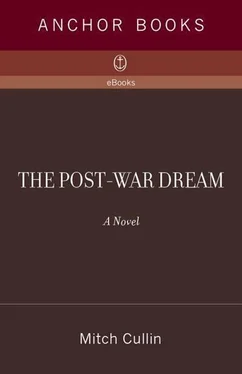But if a kind of healing was wanted, perhaps the process had already begun without effort, commencing quietly within the hazy glow of dawn and signaled by the mindful gaze of a boy who, from his bed, spied the broad, snakelike scar on the inner thigh of their guest; for Hollis had slept in the narrow room Creed had occupied with his kid brother, falling asleep on the twin mattress which had previously held the more muscular form of Edgar's military-bound sibling. Now the room had clearly become Edgar's domain with his brother's departure and death, the floor littered by the boy's comic books, battling green army men, model cars, and discarded socks and crumpled overalls. In fact, the room smelled of boy, musty and earthy, like wet dirt. Other than Edgar's clutter, though, there wasn't much else in the room but the two twin beds and a bureau and a chair where Hollis had put his suitcase.
Yet lingering traces of Creed remained evident on the wall above what had been his bed — three triangle-shaped high-school football flags, blue and gold, heralding the Fighting Tigers of Claude as district and regional champs. And on the bureau — in front of which Hollis loitered soon after waking, standing there in just a T-shirt and underwear — was a handful of Indian Head pennies positioned side by side to make the pattern of a cross, along with the tattered, blurry photograph of the girlfriend Creed had claimed he was going to marry someday, and a flat, slender piece of polished metal with hanja characters meticulously carved upon it and which, he had no doubt, had belonged to the monk they had seen run down on that desolate road from Yongdong. As he absently scratched at his scar — glimpsing those few items he had either forgotten about or never imagined seeing again in a place like West Texas — it seemed, to Hollis, as if Creed had recently visited the farm, leaving the good luck charms carried in Korea on the bureau before heading elsewhere — except that wasn't quite the case.
Still, Creed had been to Claude since Hollis last saw him alive, although he arrived within a sealed coffin, never making it back to his bedroom at the farm; his possessions, however, were afforded the courtesy, the military having forwarded them ahead of the body. Then how human those things now appeared, how unrelated to Creed they felt, and what had once seemed so cruel or somehow emblematic — the pennies, a memento stolen off a dead monk, even a girl's unfocused face on the curled paper of a ragged photograph — no longer held much significance when studied in the context of a dim farmhouse bedroom, somewhere far removed from the bloated corpses floating among rice fields or piled beneath bridges. And yet, for Hollis, that was where Creed continued to reside in his memory, that was where his version of Creed belonged — roaming assuredly, furiously below Korean hillsides, a cigarette at his lips, his rifle aimed and ready. No, Hollis couldn't envision such a soldier as ever having lived a life at the remote farm — sleeping where he'd slept, going to school and playing sports, growing up with soft-spoken family members — unless, of course, that person was someone more like himself. He pressed a finger over a penny, sliding it out of the cross pattern and along the top of the bureau. Funny, he thought, that these little things outlasted Bill McCreedy — funny that just this stuff and almost nothing else would find its way home to Texas.
When Hollis turned away from the bureau, he saw Edgar was awake and sitting upright in bed, watching him without expression, thick hair pointing wildly in a dozen directions. “Morning,” Hollis said, navigating around a traffic jam of toy cars on the floor, and then he lowered himself to the edge of Creed's mattress, facing the boy whose bed was less than three feet away. “How'd you sleep? Hope I didn't keep you up by snoring.”
But Edgar didn't answer, nor did he now stare directly at Hollis. Instead, the boy's gaze was fixed on the snaking scar, studying the wound with fascination. “It hurt?” he finally said, pointing casually at Hollis's left thigh.
Spreading his legs apart, Hollis glanced at the scar, rubbing a palm along it. “Not so much anymore. Sometimes it does, if I think about it, but mostly it only itches on occasion.”
“Looks like it hurts.”
Edgar scooted forward in the bed, sliding his bare feet out from under the sheets, bringing himself to the edge of his mattress where, as if the boy were trying to see through darkness, he bent forward to peer at the scar.
“Go ahead,” Hollis said. “Feel it if you like, won't bite you.”
At first Edgar looked like he had no intention of getting any closer to the wound, but presently he moved a hand toward the damaged thigh, gingerly easing fingers against Hollis's skin as if he were testing the heat of a flame. “You knew my brother,” the boy said matter-of-factly, two cold fingertips slowly tracing the route of the crooked scar, producing a multitude of goose pimples on Hollis's left thigh.
“I sure did.”
After a second the boy asked, “Was he your best buddy?”
Unsure of how to answer, Hollis gave an indifferent shrug of his shoulders. He then heard himself say, “Sort of, I suppose,” as his body unexpectedly turned rigid from the boy's touch.
“He was my best buddy, too.” Edgar drew his hand back, quickly retracting it to a bouncing knee covered beneath his plaid pajama bottoms. “Think a fella can have him two best buddies?”
“Don't see why not,” Hollis said, giving another shrug.
“Me neither,” the boy said. “Don't see why not neither.” Then Edgar's mouth thinned a bit before he asked, “You miss him?”
“Yes,” Hollis lied without thinking twice, “I do.”
The boy grinned and then, as he had just done with his hand, quickly retracted the expression as if he wasn't permitted to smile. However, in that brief moment, Hollis spotted something familiar on Edgar's benign face, catching a glimpse of the exact same effortless grin he had seen to the point of contempt in Korea. Yet sitting before the boy, Hollis was surprised to suddenly feel a kind of indirect affection for Creed, an unexpected tenderness and warmth he had never thought possible.
“Anyways, you wasn't snoring,” Edgar said. “If you was I'd have told you to shush. Don't like hearing snoring, that's why I don't do it.”
“Fair enough,” Hollis said, smiling at one corner of his mouth. “I don't like hearing snoring either.”
But later that morning — while Hollis stood alone on the porch, waiting for Bill Sr. to come outside and give him a tour around the property — something else was now puzzling him, something he couldn't really sort out in his head; because during breakfast Bill Sr. and Florence had spoken of how glad they were to have him there, how important it was for them to get to know the young man who had been a friend to their elder son and, as Florence told it, was highly regarded in turn. “You meant the world to our Billy,” she had said, seated at the kitchen table across from him. “Most every letter he sent home had some kind of mention of you, said you were like a second brother to him, said you was someone he'd count on in the worst of it.”
“He got a big cut on his leg,” Edgar piped up, raising his right arm and holding it at the elbow. “ ‘Bout this long as this much of my arm here.”
Like a jag of lightning, Bill Sr. struck his fork against Edgar's plate, admonishing the boy with a chewing mouthful of eggs: “Why don't you shut it and eat your breakfast.” Then as Edgar and his arm slumped, Bill Sr. swallowed hard, thrusting his fork at the center of the table to retrieve another pork chop.
“Please forgive Edgar,” Florence said, shooting the boy a quick sidelong glance which was both stern and motherly. “His mouth ails him of late.” Her glare melted when she shifted again to Hollis, and then she sighed: “Just for the life of me, I can't begin imagining what all you boys endure over in a place like that. Except you was blessed to have each other — you and our Billy — and I take great heart knowing that. We all do, Hollis.”
Читать дальше










![Theresa Cheung - The Dream Dictionary from A to Z [Revised edition] - The Ultimate A–Z to Interpret the Secrets of Your Dreams](/books/692092/theresa-cheung-the-dream-dictionary-from-a-to-z-r-thumb.webp)

